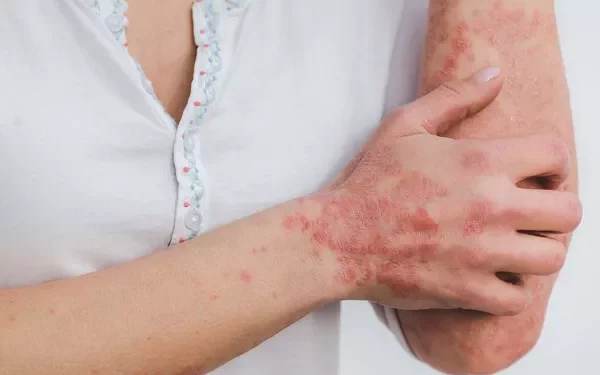Scalp psoriasis is a chronic autoimmune condition that affects the skin of the scalp, leading to red, scaly patches that can cause significant discomfort and embarrassment. It is one of the most common forms of psoriasis, a condition that impacts millions of people worldwide. Unlike ordinary dandruff or dry skin, scalp psoriasis is characterized by an accelerated growth of skin cells, resulting in thick, silvery scales that can cover large areas of the scalp. The severity of the condition can range from mild, with slight scaling, to severe, with thick crusted plaques covering the entire scalp and extending to the forehead, back of the neck, and behind the ears. The condition not only affects the physical appearance of the scalp but also has a profound impact on the quality of life, causing itching, burning sensations, and even hair loss in some cases.
SEE AALSO: What are the Drugs For Treating Scalp Psoriasis?
Definition and Causes of Scalp Psoriasis
Scalp psoriasis is a form of psoriasis that occurs on the scalp. It can extend to the forehead, back of the neck, and behind the ears. This condition is part of an autoimmune disorder, where the body’s immune system mistakenly attacks healthy skin cells, leading to an overproduction of skin cells. The exact cause is unknown, but genetics, environmental factors, and immune system dysfunctions play significant roles.
Symptoms and Diagnosis
The symptoms of scalp psoriasis include:
Red patches of skin covered with thick, silvery-white scales.
Itching and discomfort, which can range from mild to severe.
Dry scalp that may crack and bleed.
Temporary hair loss due to scratching or harsh treatment.
A dermatologist can diagnose scalp psoriasis by examining the affected area and, if necessary, performing a biopsy to rule out other conditions like seborrheic dermatitis.
Topical Medications for Scalp Psoriasis
Topical treatments are often the first line of defense against scalp psoriasis. These medications are applied directly to the scalp and can effectively reduce symptoms.
Corticosteroids: These are anti-inflammatory medications that help reduce redness and itching. They are available in creams, ointments, foams, and solutions. However, long-term use can lead to thinning of the skin and resistance to treatment.
Coal Tar: This treatment helps slow the rapid growth of skin cells and reduce scaling. Coal tar shampoos are commonly used, but they can have a strong odor and may stain clothing or bedding.
Salicylic Acid: Often found in medicated shampoos, salicylic acid helps to remove scales and reduce swelling. It can be effective but may cause irritation if used excessively.
Light Therapy for Scalp Psoriasis
Light therapy, or phototherapy, involves exposing the skin to ultraviolet (UV) light under medical supervision. This treatment can be effective in reducing symptoms, particularly for those with widespread scalp psoriasis. UVB light is the most commonly used, and treatments are typically performed in a dermatologist’s office. While effective, light therapy requires consistent sessions, and overexposure can increase the risk of skin cancer.
Oral Medications for Scalp Psoriasis
For severe cases of scalp psoriasis, oral medications may be prescribed. These include:
Methotrexate: An immunosuppressant that slows down the production of skin cells. It is effective but can cause side effects like liver damage, so regular monitoring is necessary.
Cyclosporine: Another immunosuppressant that is effective in controlling severe psoriasis. However, it carries risks such as high blood pressure and kidney damage.
Biologics: These are newer medications that target specific parts of the immune system. They are usually administered via injection and can be very effective, but they are also expensive and require regular monitoring.
Home Remedies for Scalp Psoriasis (with Caveats)
While home remedies can provide some relief, they should be used with caution and as a complement to medical treatments.
Apple Cider Vinegar: Some people find that applying diluted apple cider vinegar to the scalp helps reduce itching. However, it should not be used on cracked or bleeding skin as it can cause irritation.
Coconut Oil: Coconut oil can help soften scales and moisturize the scalp. It’s generally safe but may not be sufficient on its own for managing severe symptoms.
Tea Tree Oil: This natural oil has anti-inflammatory properties and can be soothing for some people. However, it may cause allergic reactions in some individuals, so it should be used with caution.
Conclusion
Scalp psoriasis is more than just a skin condition; it is a chronic and often misunderstood disorder that can significantly impact an individual’s physical and emotional well-being. The persistent nature of the condition, coupled with its visibility and the discomfort it causes, makes it a particularly challenging form of psoriasis to manage. However, by understanding the root causes, recognizing the symptoms early, and seeking appropriate treatment, individuals can gain control over the condition and reduce its impact on their lives.
Related Topics:

























